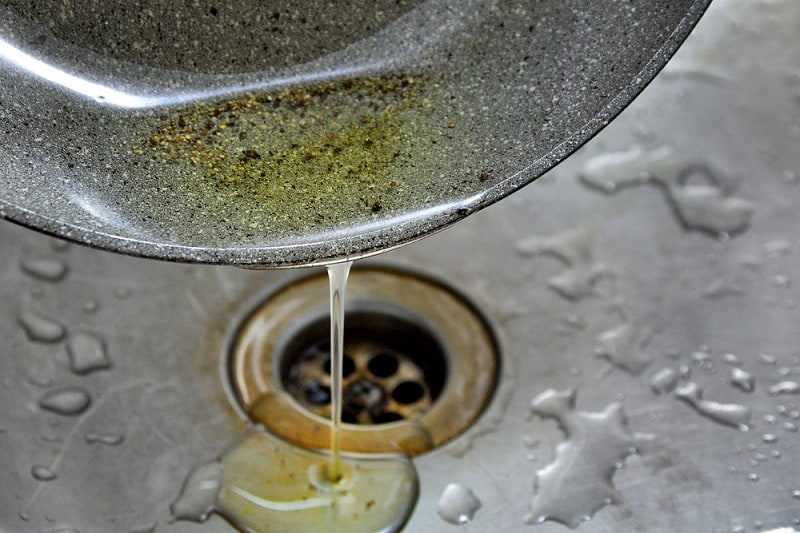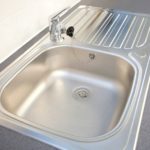Sometimes, it is easy to overlook the impact of seemingly harmless actions. One such action is pouring oil down the sink after cooking.
This might appear innocuous, but its repercussions can extend far beyond the boundaries of our homes!
In this article, we answer the question, “Can you pour oil down the sink?” and discuss the reasons it should be avoided.
From clogged pipes to long-term plumbing woes and environmental concerns, we give you three reasons to pause and reconsider your disposal habits.
We also give you three proper oil disposal methods and a step-by-step guide on what to do if you have accidentally poured oil down the sink. Keep reading for all you need to know.
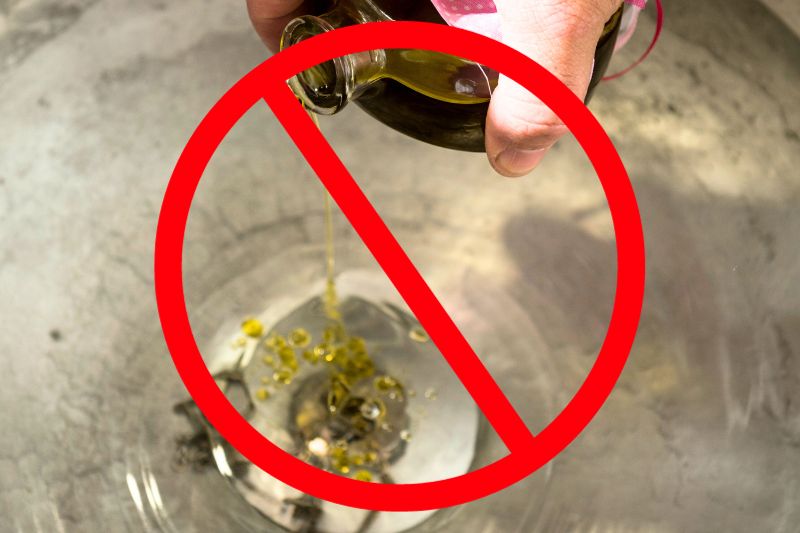
Is It Bad to Pour Oil Down the Sink?
Pouring oil down the sink is generally a bad idea. Oil and grease can cause significant problems in your plumbing, the broader sewer system in your community, and the environment.
Let’s take a closer look at the issues it can cause:
1. Oil can clog your pipes
When cooking oil and grease go down the kitchen sink, they can create clogs in your pipes. This occurs for several reasons:
- Solidification: Many cooking oils are liquid at room temperature or when heated but solidify as they cool down. When you pour hot oil down the drain, it may still be in liquid form, but as it travels through the pipes and cools, it can solidify and stick to the inner walls of the pipes. Over time, this can accumulate and create a blockage.
- Adhesion to debris: Oil has a sticky nature, and when it comes into contact with other materials in the pipes (food particles, soap scum, hair, etc.), it can bind them together. This forms a mass that grows larger over time, gradually clogging the plumbing and causing water to drain more slowly.
- Pipe narrowing: As oil solidifies and accumulates with other debris, it can narrow the diameter of the pipes, restricting the flow of water through the plumbing network. This narrowing can create a bottleneck effect, leading to water backup and drainage problems that worsen over time.
Eventually, these clogs can become severe, leading to slow drainage or complete blockages. The accumulation of oil and grease in pipes can also corrode them over time, leading to leaks and potentially expensive repairs.
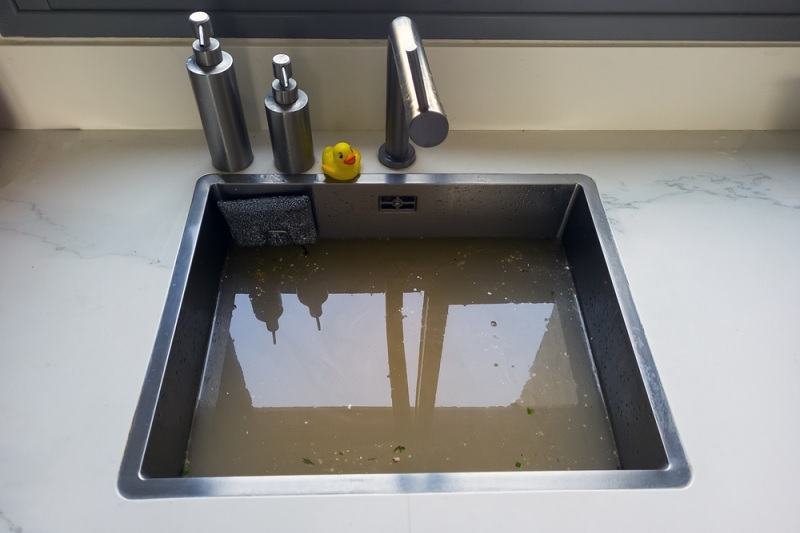
2. It might cause sewer system issues
On a smaller scale, pouring oil down the sink can cause issues within your own plumbing system.
However, disposing of cooking oils down the drain can have far-reaching consequences that go beyond your immediate surroundings—it can impact the entire community.
Oil can accumulate in larger sewer pipes, causing blockages and backups that affect multiple households and businesses.
Of the 200,000 sewer blockages in England and Wales annually, 75% are caused by fats and oils. Clearing clogs and ‘fatbergs’ can be expensive and time-consuming for homeowners and local councils, while businesses may lose income due to cleaning costs.
You alone won’t damage the local sewerage system. Only when many people in your area pour oil down their sinks can it lead to clogs in the neighbourhood sewer system.
However, you should still recognise your role in potentially making issues in your community from the innocent act of pouring oil down the sink—you might be contributing to the problem.
3. It’s bad for the environment
Oil that enters the sewer system doesn’t disappear—it continues its journey to wastewater treatment plants.
These plants might not be equipped to effectively remove fat from the wastewater, leading to contamination of water bodies, such as rivers, lakes, and oceans.
The grease pollutes the water and can reduce oxygen levels, affecting the balance of ecosystems and causing potential harm to aquatic life.
Oil can also suffocate fish and other marine life by coating their gills, impairing their ability to breathe. This can have cascading effects on larger organisms and overall ecosystem health.
To make matters worse, oil doesn’t easily break down in water. It can persist for years, continuing to harm the environment long after it’s been introduced.
How Should You Dispose of Cooking Oil?
Not disposing of oil down the sink can help prevent clogs and plumbing problems in your home. You’re also reducing your environmental impact and contributing to the health of the sewer systems in your neighbourhood. But how should you dispose of cooking oil if not down the sink?
Instead of pouring oil down the sink, try one of these three disposal methods:
1. Collect and dispose
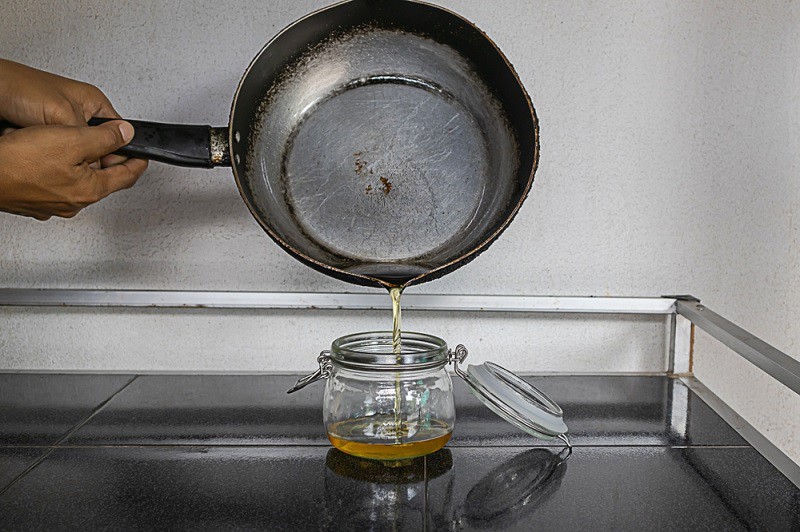
The first and easiest method for disposing of cooking oil is to collect and dispose of it. To do this, allow the oil to cool after cooking, pour it into a sealed container (like a jar or an empty can), and dispose of it in the rubbish bin. Make sure the oil is cooled completely to avoid burns.
If preferred, you can freeze or refrigerate the oil to solidify it before putting it in the rubbish bin.
Alternatively, mix it with coffee grounds, cat litter, sawdust, or another absorbent material. These other materials soak up the grease and oil for easier and quicker disposal.
The obvious downside of this method is that you are contributing to landfill waste. However, it does prevent damage to your pipes and the neighbourhood sewerage systems.
2. Recycle your oil
A better option for the environment is to dispose of your used oil by recycling it. Some areas have food waste recycling programs that accept used cooking oil. If so, allow the oil to cool before tipping it directly into your food waste bin.
If you have large amounts of oil to discard (e.g. from a commercial kitchen) or don’t have an at-home food waste recycling service, look into whether there are any options for recycling in your community.
Many recycling centres accept used cooking oil. This information is easy to find online. For example, here is the link to a recycling locator for the London area.
3. Reuse the cooking oil
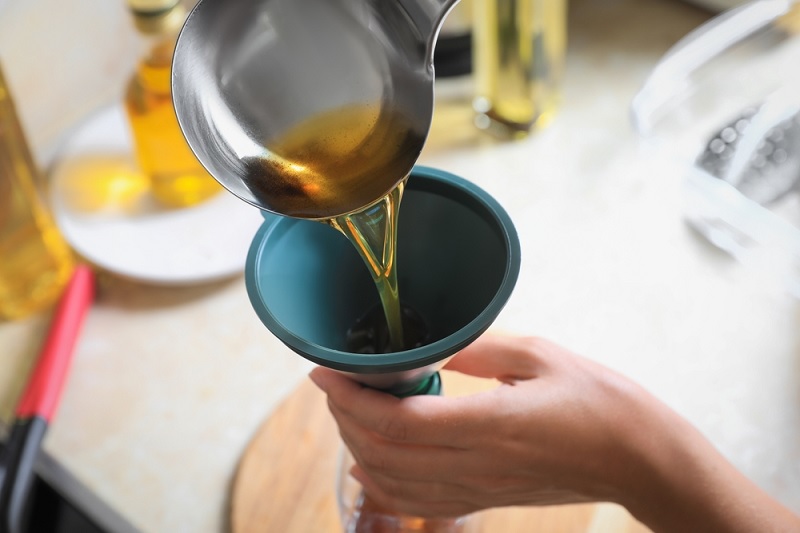
Another possibility is to reuse the oil instead of disposing of it. However, each time you reuse cooking oil, its quality degrades—it may become darker, develop off-flavours, and lose some of its frying effectiveness. Therefore, we don’t recommend reusing oil repeatedly.
As a general rule of thumb, you can use vegetable oils up to four times, whereas olive oil is only suitable for a couple of uses.
The type of frying you’re doing is also important. If you’re deep frying, the oil tends to degrade faster due to exposure to higher temperatures and more food particles.
Shallow frying or sautéing tends to be less stressful on the oil, allowing for more reuse.
If you wish to reuse your oil, there are some other considerations to keep in mind:
- Straining and filtering: After using cooking oil, strain it through a fine mesh strainer or cheesecloth to remove any food particles or debris. This helps extend the usability and remove unwanted flavours.
- Cooling and storage: Allow the used cooking oil to cool completely before storing it for reuse. Store the cooled oil in a clean, airtight container (such as a jar) to prevent contamination and odours. Keep the jar in a cool, dark place.
- Types of food: It’s essential to consider what foods were cooked in the oil before deciding to reuse it. Strongly flavoured or heavily spiced foods can leave residual flavours in the oil, which might not be desirable for other dishes.
- Smoke point: Reused cooking oil tends to have a lower smoke point, which means it may start to smoke at lower temperatures. This can affect the quality of your fried foods and potentially create a burnt taste.
What to Do If You Accidentally Pour Oil Down the Drain
If you accidentally poured oil down the drain, don’t panic. You’re not going to cause extreme harm to the sewer systems and the environment on your own as a one-off incident. Your main concern is keeping the pipes in your home clog-free and running smoothly.
Thankfully, there are straightforward steps you can take to minimise the potential damage and clogging. Here’s what you should do:
1. Don’t flush with water
The initial reaction of most people is to immediately turn the tap on and wash the oil from their pipes. Many people also consider boiling the kettle and pouring it down to ensure the heat stops the oil from solidifying in your plumbing. However, this is the worst thing you can do.
Oil is a hydrophobic molecule, meaning it cannot combine with water—it repels it. Running water can therefore cause the oil to spread and adhere to the sides of the pipes as it is repelled, making the problem even worse. You’re just pushing the fat and grease deeper into the pipes.
2. Absorb the oil
Instead of turning the tap on, quickly grab some paper towels, rags, or even old newspapers. Gently dab or place these materials over the oil spill to absorb as much oil still in the sink and around the plughole. Be cautious not to push the oil further into the drain.
Once you’ve absorbed as much oil as possible, place the towels/rags/newspaper in a sealed plastic bag to prevent any residual oil from leaking out and causing additional issues. Dispose of these in your general waste rubbish bin.
3. Boiling water and washing up liquid
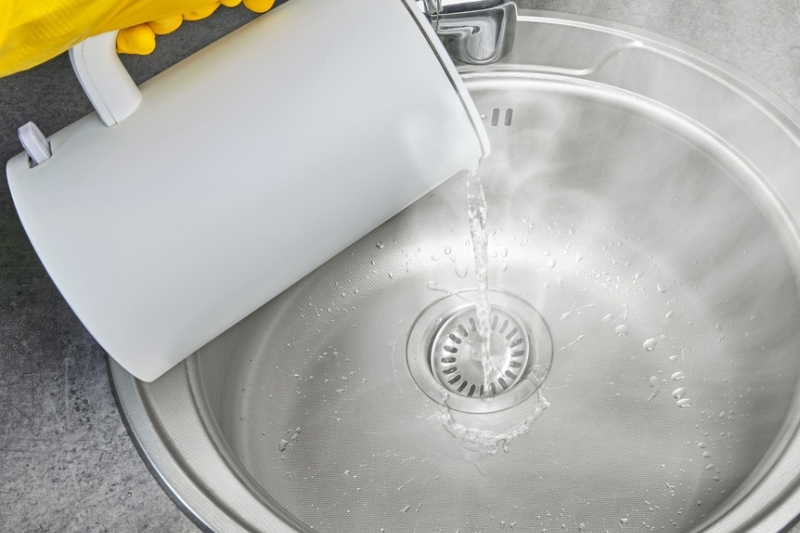
Boil a large pot or kettle of water and mix in a generous amount of washing-up liquid. The molecules in washing-up liquid are polarised—one side is hydrophobic, and the other is hydrophilic. This means that one side binds to oils and fats, and the other binds to water molecules.
Carefully pour this mixture down the drain. The hot water and soap can dissolve the oil and wash away some of the fatty residue rather than push it further into the pipes.
This should fix one-off minor spills, but it may not fully solve the problem if a significant amount of oil was poured down the sink.
4. Use a drain cleaner
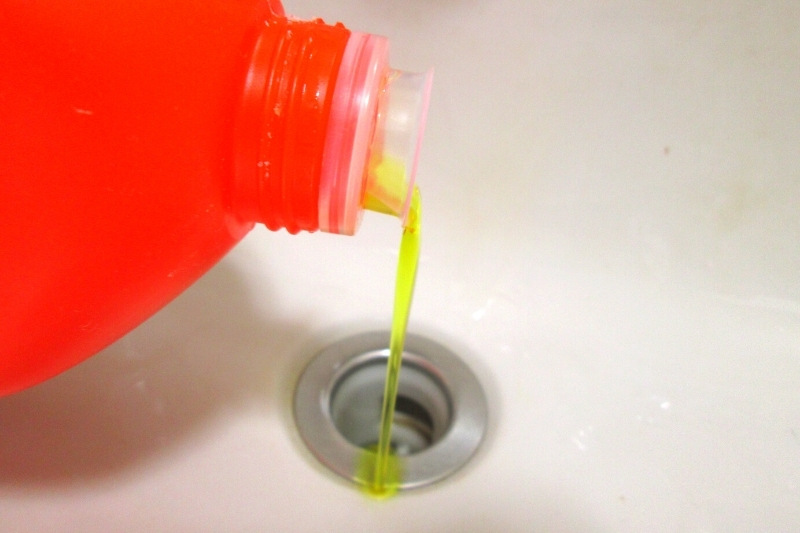
Consider using a commercial sink unblocker if you’re still concerned about your pipes being blocked. Always use these products according to the instructions, which typically involve pouring the cleaner down the drain and waiting up to 30 minutes before flushing with water.
You can also try using bicarbonate of soda and vinegar to unclog your kitchen sink:
- Pour half a cup of bicarbonate of soda down the sink drain.
- Follow with a cup of white vinegar. The mixture should start fizzing.
- Plug the drain to direct the bubbling action down the pipes.
- Wait 15 to 20 minutes before flushing with boiling water.
Using the above methods after accidentally pouring oil down the drain means it is unlikely to cause any lasting issues.
However, prevention is key. Taking care not to pour oil down the drain in the first place will save you from potential problems and help your plumbing system run smoothly – alongside being better for the local sewerage system and the planet!

Hannah has a passion for cleaning. She worked her way around Australia by cleaning hostels in exchange for free accommodation and used her cleaning skills to bag a job as a chalet host for a luxury ski company in France.
